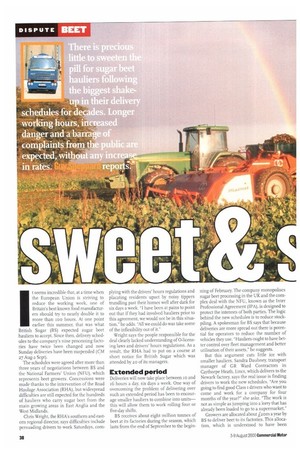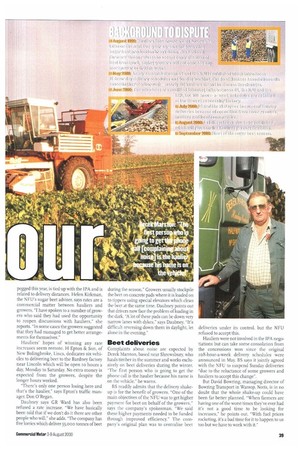t seems incredible that, at a time when the European
Page 40

Page 41

If you've noticed an error in this article please click here to report it so we can fix it.
Union is striving to reduce the working week, one of Britain's best known food manufacturers should try to nearly double it to more than ioo hours. At one point earlier this summer, that was what British Sugar (BS) expected sugar beet hauliers to accept. Since then, delivery schedules to the company's nine processing factories have twice been changed and now Sunday deliveries have been suspended (CM 27 Aug-2 Sept).
The schedules were agreed after more than three years of negotiations between BS and the National Farmers' Union (NFU), which represents beet growers. Concessions were made thanks to the intervention of the Road Haulage Association (RHA), but widespread difficulties are still expected for the hundreds of hauliers who carry sugar beet from the main growing areas in East Anglia and the West Midlands.
Chris Wright, the RHA's southern and eastern regional director, says difficulties include persuading drivers to work Saturdays, corn
plying with the drivers' hours regulations and placating residents upset by noisy tippers trundling past their homes well after dark for six days a week. "I have been at pains to point out that if they had involved hauliers prior to this agreement, we would not be in this situation," he adds. "All we could do was take some of the inflexibility out of it."
Wright says the people responsible for the deal clearly lacked understanding of 0-licensing laws and drivers' hours regulations. As a result, the RHA had to put on a course at short notice for British Sugar which was attended by 20 of its managers.
Extended period
Deliveries will now take place between io and 16 hours a day, six days a week. One way of overcoming the problem of delivering over such an extended period has been to encourage smaller hauliers to combine into units— this will allow them to work rolling four or five-day shifts.
BS receives about eight million tonnes of beet at its factories during the season, which lasts from the end of September to the begin
ning of February. The company monopolises sugar beet processing in the UK and the complex deal with the NFU, known as the Inter Professional Agreement (IPA), is designed to protect the interests of both parties. The logic behind the new schedules is to reduce stockpiling. A spokesman for BS says that because deliveries are more spread out there is potential for operators to reduce the number of vehicles they use. "Hauliers ought to have better control over fleet management and better utilisation of their assets," he suggests.
But this argument cuts little ice with smaller hauliers. Sandra Daubney, transport manager of GR Ward Contractors in Caythorpe Heath, Lincs, which delivers to the Newark factory, says the real issue is finding drivers to work the new schedules. Are you going to find good Class I drivers who want to come and work for a company for four months of the year?" she asks. "The work is not as simple as jumping into a lorry that has already been loaded to go to a supermarket."
Growers are allocated about L2OM a year by BS to deliver beet to its factories, This allocation, which is understood to have been pegged this year, is tied up with the IPA and is related to delivery distances. Helen Kirkman, the NFU's sugar beet adviser, says rates are a commercial matter between hauliers and growers. "I have spoken to a number of growers who said they had used the opportunity to reopen discussions with hauliers,” she reports. "In some cases the growers suggested that they had managed to get better arrangements for themselves."
Hauliers' hopes of winning any rate increases seem remote. H Epton & Son, of New Bolingbroke, Lines, dedicates six vehicles to delivering beet to the Bardney factory near Lincoln which will be open to hours a day, Monday to Saturday. No extra money is expected from the growers, despite the longer hours worked.
"There's only one person losing here and that's the haulier," says Epton's traffic manager, Don O'Regan.
Daubney says GR Ward has also been refused a rate increase. "We have basically been told that if we don't do it there are other people who will," she adds. "The company has five lorries which deliver 55,000 tonnes of beet during the season." Growers usually stockpile the beet on concrete pads where it is loaded on to tippers using special elevators which clean the beet at the same time. Daubney points out that drivers now face the problem ofloading in the dark. "A lot of these pads can be down very narrow lanes with dykes," says Daubney. "It's difficult reversing down them in daylight, let alone in the evening."
Beet deliveries
Complaints about noise are expected by Derek Marston, based near Shrewsbury, who hauls timber in the summer and works exclusively on beet deliveries during the winter. -The first person who is going to get the phone call is the haulier because his name is on the vehicle," he warns.
BS readily admits that the delivery shakeup is for the benefit of growers. "One of the main objectives of the NFU was to get higher payment for beet on behalf of the growers," says the company's spokesman. "We said these higher payments needed to be funded through improved efficiency." The company's original plan was to centralise beet
deliveries under its control, but the NFU refused to accept this.
Hauliers were not involved in the IPA negotiations but can take some consolation from the concessions won since the original tog.hour-a-week delivery schedules were announced in May. BS says it jointly agreed with the NFU to suspend Sunday deliveries "due to the reluctance of some growers and hauliers to accept this change".
But David Bowring, managing director of Bowring Transport in Warsop, Notts, is in no doubt that the whole shake-up could have been far better planned. "When farmers are having one of the worst times they've ever had it's not a good time to be looking for increases," he points out. "With fuel prices rocketing, it's a bad time for it to happen to us too but we have to work with it."




































































































